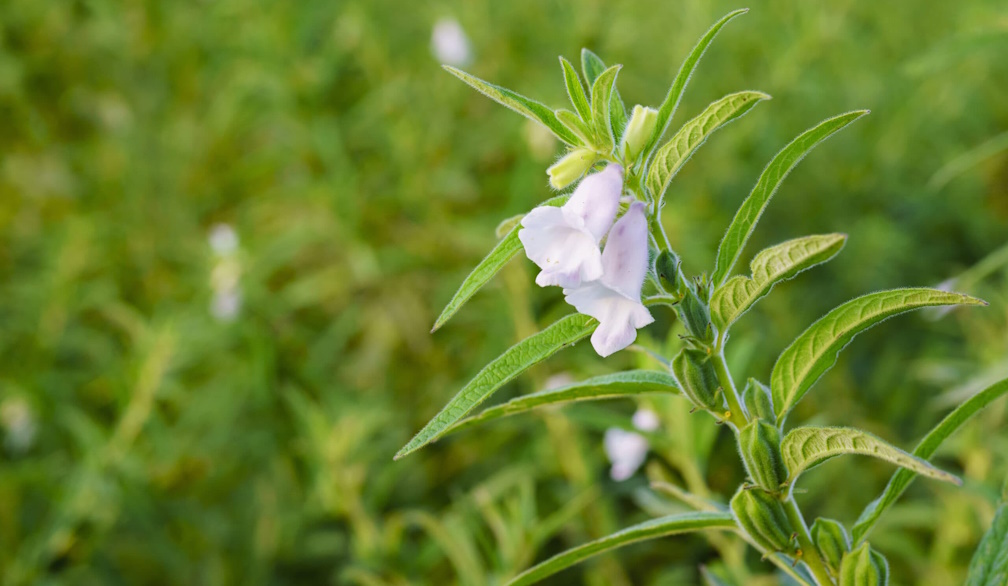Revolutionising the Sesame Industry

With the global sesame seed market expected to reach A$26 billion by 2025, the Australian sesame industry has been identified as a high-growth potential emerging industry.
The recent introduction of new high-yielding, non-shattering varieties, with high quality seed and adaptation to local conditions, is a game changer for the sesame industry, accelerating its growth as the crop can now be mechanically harvested.To capatilise on this growth, a new national Sesame Central Research and Innovation Hub has today been launched at the Central Queensland Innovation and Research Precinct (CQIRP) based at CQUniversity in Rockhampton.
Sesame Central is a collaboration between AgriFutures Australia, the Cooperative Centre for Developing Northern Australia (CRCNA) and CQUniversity (CQU). The aim is to provide a coordinated approach to sesame research in Australia with a focus on addressing practical challenges faced by growers and communicating research findings to stakeholders throughout the sesame supply chain.
As the managing research organisation for AgriFutures Australia’s $2 million sesame program of research and CRCNA’s $2m investment in the Great Northern Spices Program, CQU will co-ordinate a range of research activities in collaboration with the Australian Sesame Industry Development Association (ASIDA), universities, State and Territory governments, commercial seed companies, farm machinery suppliers and growers from across the country.
Currently the majority of whole sesame and sesame products are imported into Australia, predominantly from Africa and Asia. In 2020, Australia imported more than 13,000 tonnes worth $57.25 million.
With sesame valued at up to $2,000 tonnes at farmgate, and perfectly suited to Australia’s hot and dry conditions, it is an attractive option as a high-return break crop in broadacre farming systems, reducing reliance on imports and bolstering local production.
CQUniversity lead researcher, Dr Tieneke Trotter, said planned research included crop agronomy for maximum yield, customising machinery for planting and harvesting and post-harvest processing.
“Traditionally grown in Northern Australia, a key aim for us is to investigate new genetic lines with a shorter growing season which will allow sesame to be grown in more southern areas,” said Dr Trotter.
AgriFutures Australia Emerging Industries Senior Program Manager, Dr Olivia Reynolds, said there was a clear opportunity to replace sesame imports with Australian-grown sesame.
“Sesame is an attractive commercial proposition for growers, so it’s essential that they have the tools and information available to capitalise on this production opportunity,” said Dr Reynolds.
“In supporting the industry to scale-up production, it’s essential that farmers have access to new research, giving them the tools available so that sesame is an option for diversification or can fit within existing broadacre cropping systems across northern, and even parts of southern Queensland and New South Wales.”
CRCNA Chair, Sheriden Morris, said it was exciting to see the development of a new crop for Northern Australia that will provide diversification opportunities for farming businesses in the north.
“With the help of investment from international seed companies, the sesame industry has gained a foothold in Australia and the focus now is to scale-up production of this high-value crop,” said Ms Morris.
“Researchers will continue to trial new ‘non-shattering’ varieties which means more of the seed can be captured at harvest time for higher returns to growers and better quality for consumers.”
Different sesame varieties produce either black or white seed, which can be sold as seed for human or animal consumption, or processed into oil, paste (tahini) or flour, or used as a flavouring in confectionary.
Farmers interested in growing sesame can contact Dr Tieneke Trotter at CQUniversity on t.trotter@cqu.edu.au or 07 4930 6349.
For more information on AgriFutures sesame research program visit Sesame | AgriFutures Australia or subscribe to the emerging industries mailing list here.
Find out more about CRCNA’s Great Northern Spices Program here.









